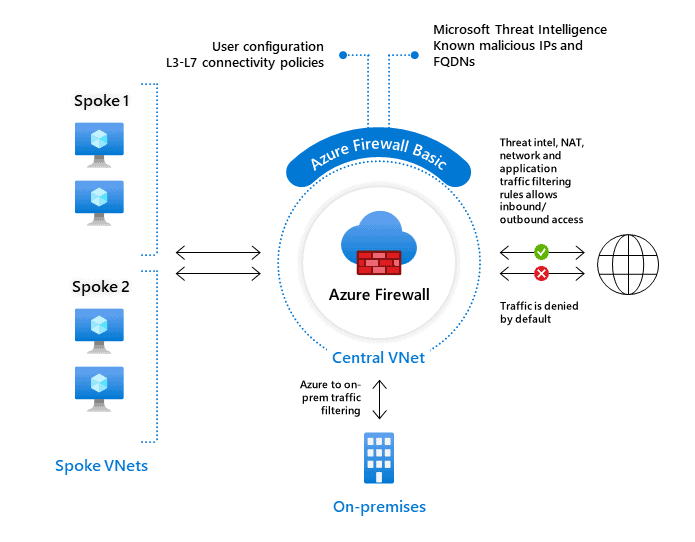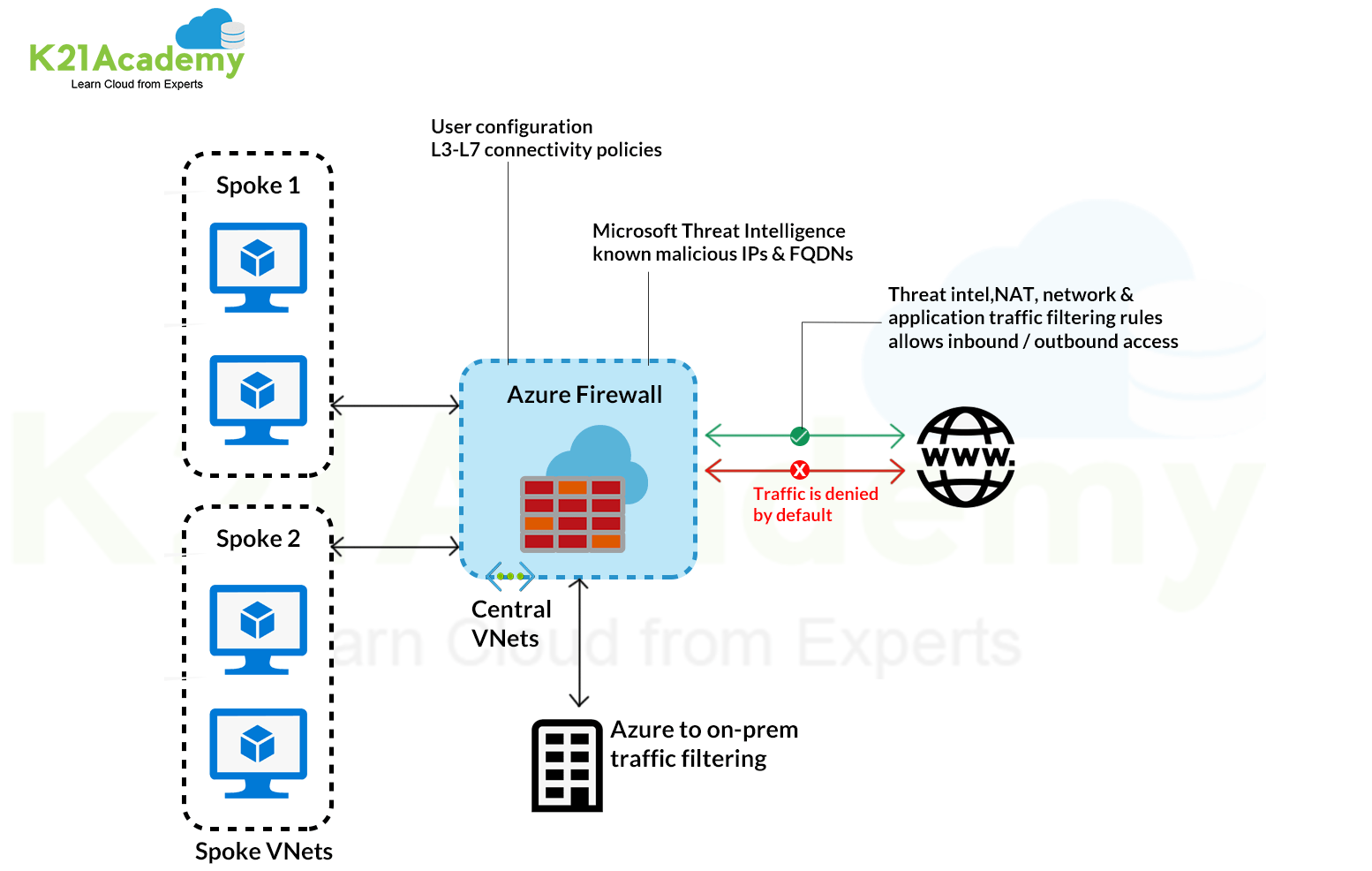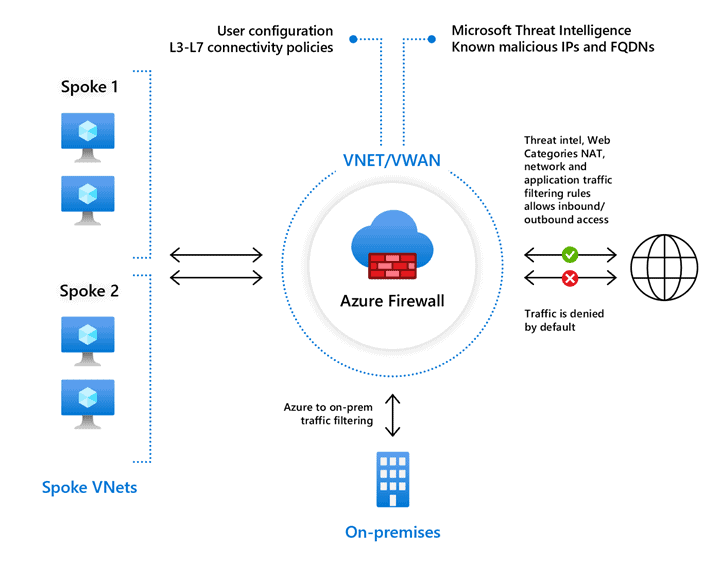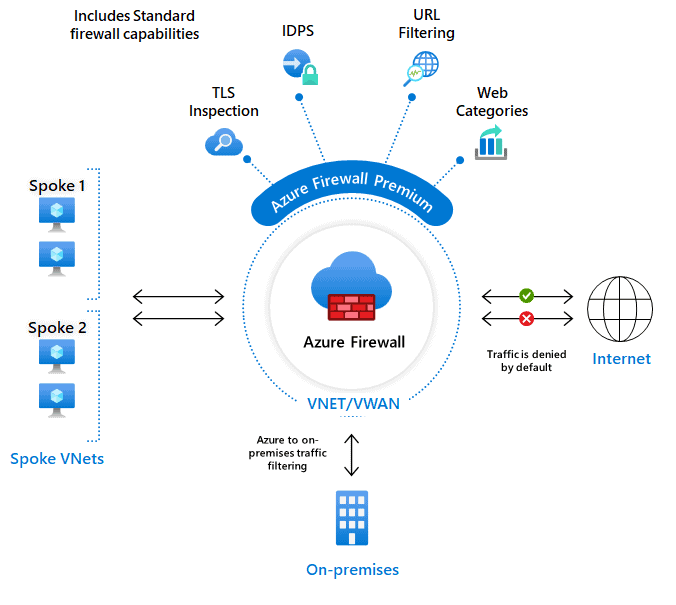Difference Between NSG and Firewall
- What is Azure Firewall?
- Azure Firewall Standard
- Azure Firewall Premium
- Azure Firewall Basic
- How does Firewall Azure work?
- What is Azure Network Security Groups (NSG)?
- How does Azure Network Security Groups work?
- Difference between Azure Firewall and Azure Network Security Groups
- Feature Comparison
- FAQs
- Conclusion
Azure Firewall
Managed Firewall Service: Azure Firewall is a cloud-based, intelligent firewall that secures your virtual network (VNet) traffic. It automatically detects workloads and protects them from threats.
- Deep Packet Inspection (DPI): Azure Firewall inspects traffic at Layers 3,4 & 7 of the OSI model, providing granular control over network traffic.
- Threat Intelligence: It leverages Microsoft’s threat intelligence to identify and block malicious traffic in real-time.
- Features:
- Advanced features like SNAT (Source Network Address Translation) and DNAT (Destination Network Address Translation) for managing public IP addresses.
- Service Tags and FQDN Tags for simplified security rule creation.
Checkout the detailed Blog on Azure Firewall
Azure Firewall Standard
Azure Firewall Standard provides L3-L7 filtering and threat intelligence directly from Microsoft Web Security.
Threat-based filtering can alert and deny traffic to and from known IP addresses and domains, and is updated in real time to prevent attacks.
Azure Firewall Premium
Azure Firewall Premium has advanced features such as signature-based IDPS, which provides rapid detection of attacks by searching for specific patterns. These patterns can include byte segments on network connections or known malicious instructions used by malware. More than 58,000 signatures across 50+ categories are updated in real time to prevent new and emerging vulnerabilities. Valid groups include malware, phishing, coin mining, and Trojan horse attacks.
Azure Firewall Basic
Azure Firewall Basic is similar to Firewall Standard with the following important limitations:
Threat only supports Intel Alert Mode
Fixed scaling units backend instance for running programs on two virtual machines
Recommended to estimate competition of about 250Mbps
 How does Firewall Azure Work?
How does Firewall Azure Work?
Azure firewall offers enough features to provide optimized control over the in and out network traffic. It eliminates the need for Load Balancer configuration because of its high availability. Microsoft Azure ensures 99.99% availability of its resources due to its availability zone feature. It does not charge anything extra for scalability. You pay only for what you use.

Moreover, it also allows restriction on outbound traffic by specifying the FQDN service. You can create your own defined rules using Azure Firewall to filter networks based on source IP, destination IP, port, and protocol. These rules further show the status as Allow or Deny status. It also enables threat intelligence features that can identify malicious IP addresses and irrelevant traffic.
Read Microsoft Defender for Cloud [AZ-500]: Everything You Should Know
Azure Network Security Groups (NSG)
- Basic Firewall for Traffic Filtering: NSG is a stateful firewall that filters traffic entering or leaving your VNet based on pre-defined rules.
- Layer 3 & 4 Security: NSG operates at Layers 3 (network) and 4 (transport) of the OSI model, offering basic traffic filtering.
- Granular Control: You can define rules to allow or deny traffic based on source/destination IP addresses, ports, and protocols.
Check out: Azure Networking
How does Azure Network Security Groups work?

Azure Network Security Group (NSG) is a great solution offered by Microsoft to protect virtual networks. Using this, administrators can comfortably organize, filter, direct, and limit various network traffic flows. You can set different inbound and outbound rules to allow or deny a specific type of traffic to configure Azure Network Security Group. If you want to use Azure Network Security Groups, you need to create and configure individual rules.
You can define any rules required as per the situation, such as to define whether the traffic flowing through the network is safe and needs to be permitted or not.
Also Check: Top 10 Best Practices for Azure Security
Difference Between Azure Firewall and Network Security Group
| Feature | Azure Firewall | Network Security Groups (NSG) |
|---|---|---|
| Service Type | Managed Firewall Service | Stateful Firewall |
| Security Level | Advanced (L3, L4, L7) | Basic (L3, L4) |
| Threat Intelligence | Yes | No |
| SNAT/DNAT | Yes | No |
| Application Security | Yes (L7 inspection) | No |
Check out: AZ-500 Exam – Microsoft Azure Security Technologies Certification
Azure Firewall and NSG in Conjunction
Both Azure Firewall and NSG provide security, but combining them increases your defences. NSGs provide you granular control over your VNet, such as allowing RDP access to a certain subnet only from authorised internal machines. Azure Firewall serves as a centralised gateway, monitoring all incoming and outgoing traffic while providing enhanced threat prevention. Together, they provide multilayer security, including granular internal control and a strong exterior security barrier.



No comments:
Post a Comment